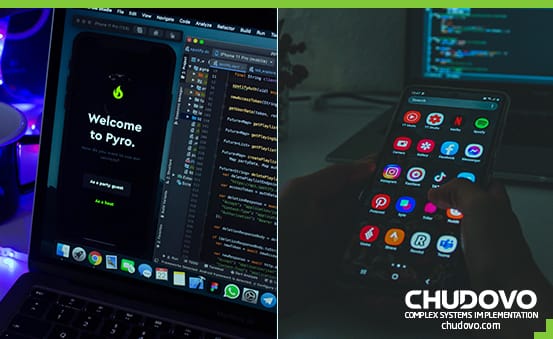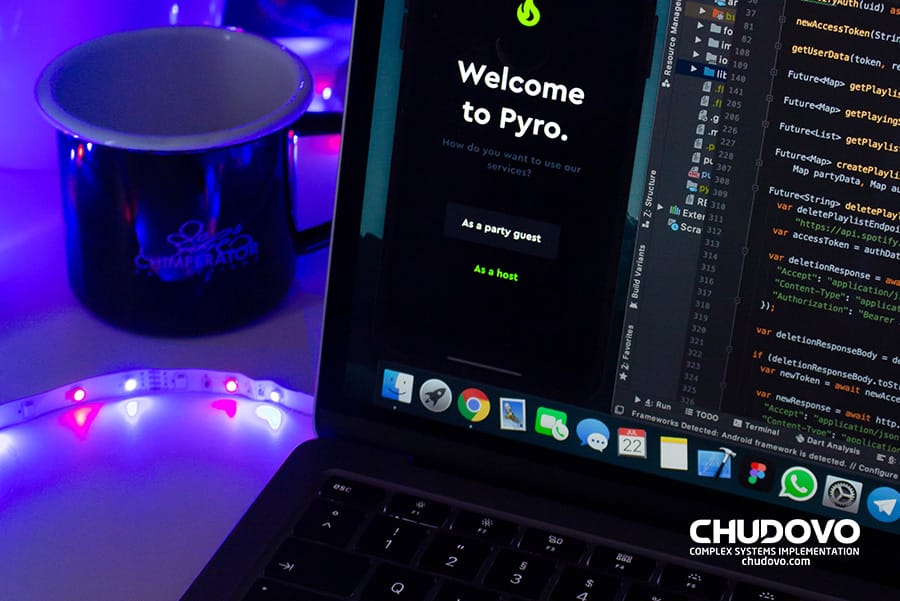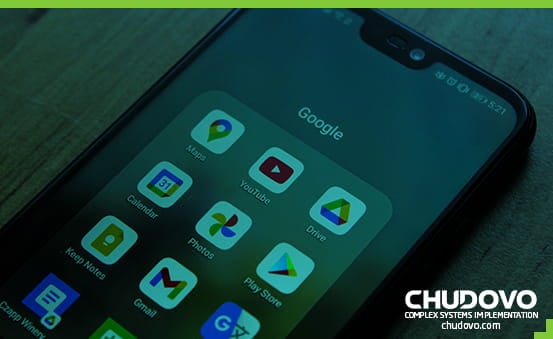
Top Major Differences Between iOS and Android App Development
Android and iOS App development systems differ from one another. They have different designs and layouts, and the architectural techniques are similar. The development of different apps costs differently from each other, and so is the maintenance approach.
In the January market share that was done by StatCounter, Android is dominating the market with 71.74%, while iOS is having 27.63% of smartphone users. The market share statistics also disprove the misconception users have about iOS being the top-selling smartphone in America.
Android and iOS app development’s biggest difference is the technical, programming languages, and testing approach, but you’ll need to know more than that when planning to build your product. In this article, you will get to learn about the differences between both development systems. After going through this article you would agree with yourself that none is better than the other and that they all have their pros and cons.
Table of contents
- What is Android app development?
- Pros and cons of Android app development
- What is iOS app development?
- Pros and cons of iOS app development
- What are the major differences between iOS and Android app development
- iOS vs Android: Monetizing your App
- iOS vs Android: which is a better platform?
- Xcode vs Android Studio
- Is there a way to dominate both platforms
- Pros and cons of cross-platform apps
- Android and iOS app development distribution model
- Conclusion
- FAQs

What Is Android App Development?
Android app development is a process of creating different applications running on the Android operating system. Here, a software engineer writes code that will create all the versions and layouts of an Android operating system.
In 2003 Android was launched as an open-source platform for smartphones and tablets. This operating system project was based on the Linux kernel, and since then, Android has become the most popular mobile operating system. The Android app system development runs over two billion Android devices in the world, and the app developers have been able to produce four million apps in the world and are still doing more.
Pros and cons of Android app development
When deciding if Android app development is the best you will want to try, you need to understand the implications that come with your choice. Read below to know the positive and negative impacts of using an Android app development system as a developer.
Pros of Android app development
- Android apps are easier to deploy and develop: Android development uses java programming language and the Android software development kit (SDK). Java programming language is widely used in developing android, and the SDK tools are used in designing, testing, and debugging tools. Any Android app development system can distribute through a Google Play Store and other app stores, which makes it easier to use.
- Android app development is typically more affordable to develop.
- Android apps are more customizable.
- The Android app development system is a good fit for embedded devices.
- You get to experience the newest SDK– flutter is the new free SDK that allows you as a developer to write native applications using a single codebase.
- With the Android app development system you can take advantage of the Latest features and technologies.
- Android apps can be designed for phones, tablets, and other devices.
Cons of Android App Development
- Android users have a bad habit of not spending, they rather prefer to use a free app than spend money to pay for it.
- Being grateful that the Android app development system is a blessing the security risk that comes with also makes it a curse. Malware and hacking target a lot of Android users almost weekly.
- This system is not user-friendly.
- Android app development systems are very hard to monetize.
- As a developer you will do more of the debugging and testing using an Android app development system.
What is iOS app development?
iOS app development is the process where the developer uses the designated programming language–objective C, to create a mobile app system like an iPhone, iPad, and iPod touch device. Apple was launched in 2008, providing a platform for developers to distribute their iOS apps.
Pros and cons of iOS app development
The Apple app store revolutionized the mobile app world making developers create apps easily and distribute them to millions of people all over the world. Since the Apple store launch in 2008, the industry has become the largest app marketplace, with over two million apps available for download. Apple’s App Store has also become a major source of revenue for developers, with over $120 billion in total sales since its launch.
Pros of iOS app development
- The iOS app development system is user-friendly– this is because the developers use objective- C or swift.
- The security risk is lesser when using an iOS app development system to make your mobile apps, the user’s phone won’t be hacked like that of the Android user. Before any app can be added to the App Store it needs to be verified, the app development system provides security against any external threat.
- iOS app development provides developers that put their app on the app store to reach a wide range of target markets such countries like the United States, and Australia.
- Apple users are loyal customers, with the latest features, technologies, and design makes the user become a fan of the Apple product and might never be okay with another mobile system again.
Cons of iOS app development
- Everything that concerns using the ios app from the implementation to the development is expensive.
- iOS app development systems are not customizable
- iOS requires knowledge of user interface design.
- More difficult to maintain and update.

What are the differences between Android and iOS app development?
Android and iOS app development have many differences that vary from the development to the programming language used, and the platforms they are designed for. Understanding these differences can help you decide which platforms are best for your app.
| Android app development | iOS app development | |
| Programming language | Android developers use java or kotlin language. | iOS has the swift or Objective -C programming language. |
| Development Environment | An android app developer uses Android studio-this IDE tool was introduced by google in 2003, with different available features. Android studio has a crass-platform high readability, and a wide range of debugging features. | iOS, on the other hand, relies on xcode tool, it supports an entire range of iOS devices and also provides different bug-fixing tools. |
| Customizability | Android is more customizable than an iOS, this app development system allows the developers to customize the user interface features and functionality on their app | iOS app development systems are more limited in terms of customizability– this system is only designed to work with Apple’s operating system and hardware. |
| System-specific design | Android apps are developed in partition, the developer or coding team will have to break the app down into fragments and projects. | The iOS app development relies on an architectural view controller |
| Cost of development | Android is typically less expensive for a developer to develop as the programming language will be Java and Android SDK. | iOS is more expensive to develop, as the developer will have the knowledge of iOS SDK, swift and Objective-C programming language, and user interface design. |
| Development complexity | Android app development loses by a big number because it has to do with device fragmentation. They are different dozens of screen styles | iOS is easier to handle when it comes to development complexity. Apple, on the other hand, has small screen dimensions to account for. |
| Testing and Debugging | Debugging and testing in an Android app development is very easy because the developer would use the Android SDK and java programming to run the code. | For iOS, debugging and testing is more time-consuming and complex. |
| Widget support | The Android system supports widgets on its home screen except for the lock screen. | iOS is new to the widgets support, as the app just currently adds the widget support to the new version of the iOS device. |
| App design | Android developers design the app device from real-world inspiration, in which color and motion are big defining factors. | The most common tool used by a UI designer is gradient and shadows. The app development system has priority over the designs. |
| Availability of app stores | Android app development can distribute to the google play store and any other third-party app store, this process can affect the visibility and reach of an app. | iOS can only be distributed through the Apple app store |
Furthermore, the user interface design of Android and iOS apps has an impact on the user experience. Android apps typically use a Material Design interface, which is based on the use of bold colors, typography, and motion to create a modern, intuitive user experience.
iOS apps use a flat design interface, which is based on the use of subtle colors, typography, and minimalistic elements to create a clean, elegant user experience. Depending on your preferences, you may find that you prefer the look and feel of one operating system over another.
When submitting an app to the app stores, the approval process for Apple can take a few days, while Google’s approval process typically only takes a few hours. Both app stores manually review apps, but Apple has more stringent requirements and guidelines that developers must adhere to, which may require additional time to understand and implement.
Android apps offer a larger audience reach, more customization options, and access to multiple app stores, while iOS apps offer a shorter development cycle, more control over the user experience, and access to the Apple App Store.
iOS vs Android: Monetizing your App
Monetization is another difference you should consider when talking about Android and iOS app development. There are three different ways to profit from running a mobile app as a developer, and they are in-app purchase, paid application, and ad-based model. Let’s look at a brief breakdown of how you can monetize your app as a developer:
- In-app purchases: Android apps have a higher rate of purchases than iOS apps, with 22% of purchases being made on Android compared to 17% on iOS.
- Paid application: iOS is the leader when it comes to releasing paid apps directly to the app store, with 11% of iOS game apps being paid, compared to 7% for Android.
- Advertising-based model: Most iOS apps do not use ads, with only 22% of non-gaming apps having implemented advertising SDKs. Android apps, however, are more likely to use ads, with 63% of Android apps having implemented advertising SDKs.
In-app purchases allow users to purchase items within the app, while subscription models allow users to pay a recurring fee for access to the app. Advertising is another popular monetization option, as it allows developers to generate revenue from displaying ads in their apps. It’s worth of mention that iOs apps have the highest return on investment than Android apps.
iOS vs Android: which is a better platform?
Now that you know the difference between Android and iOS app development, as a developer who already knows one of them or you are starting out a project and want to know which is better for your app or for career-wise?
It is difficult to say that one platform is better than the other as it depends on the specific needs and goals of the developer. But let’s use an example.
Career-wise, if you have the intention of being a mobile app developer and you are wondering which app development would be better to venture into, iOS app development is best because it is easier to learn and doesn’t need a lot of time-consuming programming language, unlike the Android app development that would need you to understand the Java programming language or Kotlin.
For a developer who is aimed at making an app but doesn’t have the budget, then an Android mobile app development is your go-to mobile app development system. The programming language and the budget for the app will cost less.
iOS apps tend to be more user-friendly and secure than Android apps, while Android apps are typically more customizable and cost-effective. Ultimately, the best platform for app development will depend on the individual needs of the developer.
Xcode vs Android studio
As a mobile app developer exploring the differences between the Android studio tool and the Xcode tool will let you know the pros and cons of each and which you will decide to use. Here are a few things to note:
- Android Studio and Xcode tools are both popular tools that are used by developers to create mobile apps.
- Android studio is the official integrated development environment for Android while Xcode is the Official IDE for iOs.
- Android Studio is designed for developing Android apps using the Java programming language, while Xcode is designed for developing iOS apps using Objective-C or Swift programming languages.
- Android studio can quickly create multiple versions of your app for various devices and offers a flexible-based build system. While the Xcode has a decent source editor and layout.
- Android studio tools offer the largest range of features and tools that help developers to create high-quality apps while Xcode offers a streamlined development experience.
- Most developers make their personal preferences based on their habits or likings, A developer who decides to use Xcode like it is an easy startup while Android studio fans like an improved code editor and layout designer.
- Bigger projects make the Xcode tool complicated while the Android studio tool consumes a lot of memory.
Though it’s hard to find developers specializing in both Android and iOS development, once the platform choice is made most of them do not need to compare the above-mentioned IDE.

Certified engineers
Convenient rates
Fast start
Profitable conditions
Agreement with
EU company
English and German
speaking engineers
Is There a Way to Dominate Both Platforms?
If a developer eventually wants to make money from the Android and iOS markets, they need to go for the single cross-platform app instead of the two native products. Although, this can affect the visibility and the reach of the app so you need to be familiar with the pros and cons of cross-platform solutions.
Pros and cons of cross-platform apps
Pros of cross-platform apps
- Reusable code
- Speed increase
- Save time and money as opposed to building separate native apps.
- The app looks and functions the same across all platforms, making it easy for users to transition between devices.
- Higher audience reach.
Cons of cross-platform apps
- The cross-platform apps lack flexibility and rich features.
- It’s difficult to optimize the app for each platform.
- As the codebase is shared across different platforms, it can be difficult to make sure that the app looks and functions the same on all devices.
- User experience Limitations.
- Maintenance challenges.
- Some features may not be available on all platforms, which can limit the functionality of the app.
Android And iOS App Development Distribution Model
The Android and iOS app development distribution models differ in terms of the app stores available. iOS apps can be distributed through the Apple App Store. Apart from releasing apps to be downloaded, iOS offers Mobile app developers an enterprise distribution model.
As a developer, you will be able to distribute apps under a private license and get access to advanced development and testing utilities. The app store policies and guidelines for each platform can vary, so developers should be aware of the differences before submitting their apps.
While Android apps can be distributed through the Google Play Store and other third-party app stores. This can affect the visibility and reach of an app, as well as the monetization options available. A developer can also decide to distribute its app using the Amazon app store– this has been a marketplace for Android applications since 2011 and is available in over 200 countries.
Android app distribution models offer developers the chance to reach a larger audience, while iOS provides developers with convenient programs for releasing their own proprietary technologies. It’s always better to consider the facts before making a decision.
Conclusion
Having to make a choice between Android and iOS app development as a developer is not easy because both platforms come with different advantages and drawbacks. The major differences between Android and iOS app development include the programming languages used, the development tools available, the app stores available, and the customization and monetization options available.
If you have a larger budget and are targeting a specific premium segment, iOS is the better choice. However, if you are looking to test the app market, reach a global audience of users, or have a limited budget, Android may be a better option for you.
Due to the rigorous process of application uploading and moderation, the iOS App development system is a safer source for apps than the Google Play Store. There is a lower risk of being tricked by a malware distributor. And if your app has been approved by the App Store moderation, you can be confident that it is secure.
FAQs
Curious about the differences between Android and iOS app development. Here are some frequently asked questions about the differences between Android and iOS app development:
What programming languages are used for Android and iOS app development?
Android apps are typically developed using the Java programming language and Android Studio, while iOS apps are typically developed using the Objective-C or Swift programming languages and Xcode.
What are the customization options for Android and iOS apps?
Android apps are typically more open to customization and third-party integrations than iOS apps, while iOS apps offer more control over the user experience and design
What are the differences in the user interface design for Android and iOS apps?
Android apps typically use a Material Design interface, which is based on the use of bold colors, typography, and motion to create a modern, intuitive user experience. iOS apps typically use a flat design interface, which is based on the use of subtle colors, typography, and minimalistic elements to create a clean, elegant user experience.
What are the main differences between Android and iOS app development?
The main differences between Android and iOS app development include the programming languages used, the development tools available, the app stores available, and the customization and monetization options available.
What are the app store options for Android and iOS?
Android apps can be distributed through the Google Play Store and other third-party app stores, while iOS apps can only be distributed through the Apple App Store.
If you need highly qualified android&iOS app developers at the right price for your project, contact us now!


